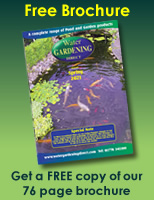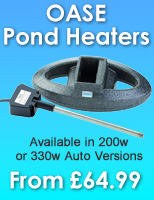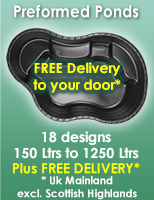Autumn Koi And Goldfish Pond Maintenance
Welcome to Water Gardening Direct, your "One-Stop solution" for all your
Pond Equipment, Water Features and Spare Parts.
We hope our site has all the Help and Advice you need, but if not
please feel free to give us a call on 01778 341199
Pond Equipment, Water Features and Spare Parts.
We hope our site has all the Help and Advice you need, but if not
please feel free to give us a call on 01778 341199
or click here to order or download our FREE Brochure
Online Chat and Phone Services available Monday - Friday, 9am - 5pm
Standard Delivery to Northern Ireland now available for most items - only £17.99
FREE Standard Delivery for orders OVER £50 (UK Mainland excluding Scottish Highlands and Islands)
£3.99 Standard Delivery for orders Under £50 (UK Mainland excluding Scottish Highlands and Islands)
Next Weekday Delivery option available for most products ordered by 2pm (UK Mainland only, excluding very large items).
Related Sections
- Free Water Gardening Direct Product Brochure
- How To Measure Your Pond Volume
- How To Calculate Your Pond Liner Size
- Reducing Energy Costs Of A Pond
- How To Calculate The Flowrate Of A Pump
- How To Design A Pond
- How and When To Feed Your Fish
- All about Fish Spawning
- Autumn Koi And Goldfish Pond Maintenance
- Looking After A Pond In The Winter
Customers Reviews
Here is some of our customer feedback.
"Brilliant company to buy from - would definitely recommend"
Rich Watts
November 2024
Rich Watts
November 2024
"Fantastic service, friendly and helpful."
Nigel Leale
November 2024
Nigel Leale
November 2024
"The information on the website was very helpful in choosing the right pond for us."
Jane Potter
November 2024
Jane Potter
November 2024
"The company helped me get the correct parts were other weren’t interested"
Alan West
November 2024
Alan West
November 2024
"Good Value - Great LED lights and even greater customer service"
Terry Smith
November 2024
Terry Smith
November 2024
"Would recommend water Gardening Direct to everyone. Well done keep the good work going"
Lisa Clarke
November 2024
Lisa Clarke
November 2024
"Absolutely superb. Extremely friendly and prompt."
Simon Winter
November 2024
Simon Winter
November 2024
"Superb service, very quick delivery and best prices for the equivalent products."
Dominic Shaw-Mciver
November 2024
Dominic Shaw-Mciver
November 2024
"Very helpful - responded quickly to problems with courier"
Vivienne Foulds
November 2024
Vivienne Foulds
November 2024
"Easy to contact and very helpful in sorting out a courier problem"
Vivienne Foulds
November 2024
Vivienne Foulds
November 2024
"Item in stock, delivered the next day when other suppliers did not have the part in."
Dave Halford
November 2024
Dave Halford
November 2024
"Marvelous service. Have used WGD several times before and will continue to do so"
Mike Smith
October 2024
Mike Smith
October 2024
"Excellent service - reliable advice and helpful with enquiries"
Angela Read
October 2024
Angela Read
October 2024
"Excellent service product was delivered on date and time given. Would recommend WGD"
David Portbury
October 2024
David Portbury
October 2024
"All questions answered with one phone call"
John Gibbs
October 2024
John Gibbs
October 2024
"Great supplier, provided the part I needed after struggling to find elsewhere."
Phil Spencer
October 2024
Phil Spencer
October 2024
"First class service"
Shane Fenner
October 2024
Shane Fenner
October 2024
"Very helpful and knowledgable"
Margaret Heath
October 2024
Margaret Heath
October 2024
"Great company, magic very quickly delivered."
Raymond Hall
October 2024
Raymond Hall
October 2024
"Would buy again from this supplier. The service was perfect."
Barbara Reynolds
October 2024
Barbara Reynolds
October 2024
"Great advice and service"
Elizabeth Tomlinson
October 2024
Elizabeth Tomlinson
October 2024
"Very good, James is very helpful"
Nick West
September 2024
Nick West
September 2024
"Always excellent service. Highly recommend this company. Have used for several years."
Shirley Loveday
September 2024
Shirley Loveday
September 2024
"Quality service quality product would highly recommend"
Samuel Steeper
September 2024
Samuel Steeper
September 2024
"Helpful and friendly staff"
Stella Wilson
September 2024
Stella Wilson
September 2024
"Brilliant service, could not fault it."
Peter Salur
September 2024
Peter Salur
September 2024
"A pleasure to use this company. Service was prompt"
Kathleen Wilde
September 2024
Kathleen Wilde
September 2024
"Great communications and fast delivery cheaper than other outlets"
Gay Stevens
September 2024
Gay Stevens
September 2024
"Excellent service - very good communication, kept me informed and super quick delivery"
Heather Coleman
September 2024
Heather Coleman
September 2024
"Reliable with a good range of products."
Ian Finlayson
September 2024
Ian Finlayson
September 2024
"Good for large floaters. Very good, helpful and knowledgeable"
John Egan
September 2024
John Egan
September 2024
"Website was brilliant showing diagram of pump and what was required."
Ralph Shuttlewood
September 2024
Ralph Shuttlewood
September 2024
"Would recommend - First class."
Victor Fay
September 2024
Victor Fay
September 2024
"Found staff extremely helpful and delivery on time"
Trevor Parker
September 2024
Trevor Parker
September 2024
"Smooth transaction from start to finish"
Douglas Baird
September 2024
Douglas Baird
September 2024
"Very good to deal with and deliver when they say they will."
Mark Sherlock
August 2024
Mark Sherlock
August 2024
"What's not to like? - Always first class."
Norma Crumpton
August 2024
Norma Crumpton
August 2024
"Good stocks of spare parts, and always delivered promptly and well packed."
W James Allison
August 2024
W James Allison
August 2024
"WGD stocked the item unavailable elsewhere alleviating solar water feature disposal"
Shane Davies
August 2024
Shane Davies
August 2024
"Excellent advice on the products and quick delivery"
Melanie Sailes
August 2024
Melanie Sailes
August 2024
"Excellent to do business with listening to the customer with good advice"
Mark Ward
August 2024
Mark Ward
August 2024
"Excellent Service. A product query was dealt with efficiently and professionally"
Brian Bell
August 2024
Brian Bell
August 2024
"I recommend Water Gardening Direct - Very fast delivery, professionaly served."
Andrei Cozma
August 2024
Andrei Cozma
August 2024
"My first choice for anything garden pond related."
Mark Mccormick
August 2024
Mark Mccormick
August 2024
"Brilliant service, wouldn't hesitate to recommend them. Very helpful with any queries"
Sandrra Cooper
August 2024
Sandrra Cooper
August 2024
"Brilliant contact and information. Extremely happy to have done business with them."
Stewart Plowes
August 2024
Stewart Plowes
August 2024
"Comprehensive web site with a good selection of garden products."
Gordon. Scourfield
August 2024
Gordon. Scourfield
August 2024
"Water Gardening Direct service has been very good."
William Hughes
August 2024
William Hughes
August 2024
"Excellent service easy to order on line, quick delivery and a good choice of materials"
Melanie Hopwood
August 2024
Melanie Hopwood
August 2024
"Really great service"
Lesley Carey
August 2024
Lesley Carey
August 2024
"Great service and excellent product. Very helpful with advice and quick posting"
Christopher Gilmore
July 2024
Christopher Gilmore
July 2024
"Very knowledgeable friendly helpful staff. Highly recommended."
James Mcgeachy
July 2024
James Mcgeachy
July 2024
"Online ordering was painless, quick delivery"
Kingsley Warren
July 2024
Kingsley Warren
July 2024
"Quick Service and delivery, very pleased."
William Louzado
July 2024
William Louzado
July 2024
"A good clear website and a very easy purchasing experience."
Geoffrey Tilley
July 2024
Geoffrey Tilley
July 2024
"Excellent service, great advice, clearly knowledgeable about their products"
Ian Lowe
July 2024
Ian Lowe
July 2024
"Buy with confidence - Prompt and reliable service. Good communication"
Tim Richards
July 2024
Tim Richards
July 2024
"Water Gardening super service. A pleasure to do business with and would fully recommend"
Christopher Barnard
July 2024
Christopher Barnard
July 2024
"Absolutely excellent service - Delivered within 48 hours and my fountain is restored"
Yvonne Southall
July 2024
Yvonne Southall
July 2024
"Brilliant - amazing communications and really do care about their customers."
Spencer Allen
July 2024
Spencer Allen
July 2024
"Super company. Very reliable."
Maggie Nicoll
July 2024
Maggie Nicoll
July 2024
"Excellent service. I had to phone for advice and they were very helpful"
Michael Powell
July 2024
Michael Powell
July 2024
"This great company has damaged bird bath fitting replacements & excellent delivery"
Susan Hitchman
July 2024
Susan Hitchman
July 2024
"Very knowledgeable friendly helpful staff. Highly recommended."
James Mcgeachy
July 2024
James Mcgeachy
July 2024
"Easy to use website with sufficient detail for me to find the exact product I needed."
Sue Popplewell
July 2024
Sue Popplewell
July 2024
"10 out of 10 customer service"
Stephen Lynch
July 2024
Stephen Lynch
July 2024
"Highly recommend with excellent stock range. Smooth easy ordering and super delivery"
Phillip Pugh
July 2024
Phillip Pugh
July 2024
"The advice given was very prompt and helpful. My order was received promptly and safely"
Penny Stevens
July 2024
Penny Stevens
July 2024
"Great water feature solar panel, good service, very prompt delivery, easy to use website"
Moira Robinson
July 2024
Moira Robinson
July 2024
"Fabulous fast delivery"
Leigh Hoban
July 2024
Leigh Hoban
July 2024
"Would use again. Good company to deal with. Very quick response and very good service"
Graham Chant
July 2024
Graham Chant
July 2024
"Properly described and the screen upgrade sieves fit."
David Robson
July 2024
David Robson
July 2024
"Great service and fast delivery. Very pleased with pond, many thanks"
Craig Lovett
July 2024
Craig Lovett
July 2024
"Very helpful customer service during ordering and the item arrived very quickly."
Janice Sutton
July 2024
Janice Sutton
July 2024
"Great customer service - Excellent. Fast, friendly and helpful response to enquiry"
Sarah Garland
July 2024
Sarah Garland
July 2024
"Products I ordered were delivered in a fast and efficient manner"
Lesley-Anne Mclelland
July 2024
Lesley-Anne Mclelland
July 2024
" Easy to use website, speedy delivery, reasonable costs - whats not to like!!"
Susan Christie
July 2024
Susan Christie
July 2024
"I love the fact that the company offers replacement parts"
Sharon Elizabeth Rae
July 2024
Sharon Elizabeth Rae
July 2024
"They were very helpful"
Evelyn Hay
June 2024
Evelyn Hay
June 2024
"Easy company to supply and sort out any issues brilliant customer service"
Valerie Herbert
June 2024
Valerie Herbert
June 2024
"Easy to navigate the website. Fast delivery. Would definitely recommend to everyone."
Yvonne Fletcher
June 2024
Yvonne Fletcher
June 2024
"First class service"
Carol Maclean
June 2024
Carol Maclean
June 2024
"Very pleased one hundred percent with the service i received"
Kenneth Hodgson
June 2024
Kenneth Hodgson
June 2024
"Excellent service, knowledgeable and impartial. Saved me money,analysing my requirements"
Mike Dernie
June 2024
Mike Dernie
June 2024
"Would shop here again! Very efficient and great product."
Katie Abbott
June 2024
Katie Abbott
June 2024
"Very efficient and easy to deal with. Excellent service all round."
Paul Eggleton
June 2024
Paul Eggleton
June 2024
"Excellent, very fast service"
Saniah Griffiths
June 2024
Saniah Griffiths
June 2024
"Products are great value for the money"
Mike Parsons
June 2024
Mike Parsons
June 2024
"Great first class fast delivery, easy to fit will recommend"
William Phelps
June 2024
William Phelps
June 2024
"Excellent service plus good value. WGD are my go-to company for anything pond related"
Valborg Byfield
June 2024
Valborg Byfield
June 2024
"The service was excellent. I would recommend this company to my friends and family."
Shirley Bucknall
June 2024
Shirley Bucknall
June 2024
"WGD - excellent product selection, easily navigable website - great one stop solution"
Martin Mills
June 2024
Martin Mills
June 2024
"Super servce and having replacement parts is a way forward"
Leslie Mackenzie
June 2024
Leslie Mackenzie
June 2024
"Excellent company who went above and beyond what was expected - pleasure to deal with"
Jean Hales
June 2024
Jean Hales
June 2024
"First class. Knowledgeable and keen to assist. What more is there to say"
Brian Marshall
June 2024
Brian Marshall
June 2024
"Good product and excellent supplier, answering prouct queries without the - big sell"
Carmel Moore
June 2024
Carmel Moore
June 2024
"Highly recommend, and quick delivery of items with standard delivery"
Chris Hawkins
May 2024
Chris Hawkins
May 2024
"WGD are as good as their word for delivery and at a very competitive price."
Donald Williams
May 2024
Donald Williams
May 2024
"Efficient from purchase to receipt of item. Would definitely recommend WGD"
Linda Jackson
May 2024
Linda Jackson
May 2024
"Meaningful support:Very helpful indeed. I would have struggled without conversations"
Paul Loveless
May 2024
Paul Loveless
May 2024
"Straight forward ordering system, very helpful staff if you have any questions"
Tracy Oakley
May 2024
Tracy Oakley
May 2024
"Very professional company. Easy to contact. Arrived on time in good nick."
Shane Shrimpton
May 2024
Shane Shrimpton
May 2024
"Second to none for efficency. Second to none for efficency"
Sandra Mcwilliam
May 2024
Sandra Mcwilliam
May 2024
"Watergardeningdirect Top Team - super helpful, friendly, calm and considerate."
Steve Finch
May 2024
Steve Finch
May 2024
"Good communication, swift despatch, well packaged."
Susan Jones
May 2024
Susan Jones
May 2024
"Got a brochure and pleased with the prices compared to garden centres i have visited"
Angela Tillett
May 2024
Angela Tillett
May 2024
"Excellent service, well packed and healthy plants"
Rosalyn Edwards
May 2024
Rosalyn Edwards
May 2024
"Easy to find products with clear pricing, promptly delivered. No hidden extras"
Julie Breeze
April 2024
Julie Breeze
April 2024
"I struggled to find desperately needed Oase filtoclear parts but WGD had everything"
Helen Jones
April 2024
Helen Jones
April 2024
"Friendly service and advice over the phone"
Barbara-Ann Greig
April 2024
Barbara-Ann Greig
April 2024
"Great service from ordering to delivery."
David Barton
April 2024
David Barton
April 2024
"An excellent array of pond accessories. Definitely a go-to for ponds,fish or wildlife"
Gill Coles
April 2024
Gill Coles
April 2024
"Great pond. The gentleman arranging delivery was polite, friendly & well-prepared."
Sally Pitman
March 2024
Sally Pitman
March 2024
"Easy to order the parts via the website and quick delivery"
Tony Murphy
March 2024
Tony Murphy
March 2024
"Great advice and service"
Evelyn Hay
March 2024
Evelyn Hay
March 2024
"Good company to deal with - very fast delivery & alot cheaper than other suppliers"
Keith Hazell
March 2024
Keith Hazell
March 2024
"Really quick service and the products were a very good quality"
Stuart Rainbow
March 2024
Stuart Rainbow
March 2024
"First class prompt delivery -Just what I needed.My usual supplier didn't stock spares"
Nicholas Fisher
March 2024
Nicholas Fisher
March 2024
"Part was exactly what I wanted delivered to me within 36 hours- outstanding"
Robin Frowd
March 2024
Robin Frowd
March 2024
"Excellent customer service, prompt despatch & professional,quick response to purchase"
Wendy El Heni
March 2024
Wendy El Heni
March 2024
"Honestly brilliant. Dragonfly Plus 1000 pond arrived on time and exactly as described"
Susie Essex
March 2024
Susie Essex
March 2024
"Very easy to deal with"
Richard Beadman
March 2024
Richard Beadman
March 2024
"I have ordered several items over the years and never been disappointed"
Albert Smith
February 2024
Albert Smith
February 2024
"Their brochure had very good detailing of their products, even had a plant section."
Andrew Fraser
February 2024
Andrew Fraser
February 2024
"Fantastic range, excellent prices, lightening delivery, 110% recommend."
Richard Barrell
February 2024
Richard Barrell
February 2024
"Such efficient and friendly service is not so easy to come by these days!"
Peter Giddings
February 2024
Peter Giddings
February 2024
"Excellent quality, Prompt and professional company"
Eric Grieve
February 2024
Eric Grieve
February 2024
"Quich dispatch and delivery, careful and secure packaging ensured safe delivery."
Barbara Cook
January 2024
Barbara Cook
January 2024
"Good web page so clearly found item I needed, followed by rapid delivery of part"
Philip Waugh
January 2024
Philip Waugh
January 2024
"I would highly recommend WGD for great customer service and extremely speedy delivery"
Jayne Johnstone
January 2024
Jayne Johnstone
January 2024
"Excellent online help,extensive stock at sensible prices,easy ordering &fast delivery"
John Dickinson
January 2024
John Dickinson
January 2024
"Shop with confidence-finding item & ordering were a simple process, excellent delivery"
Michael Mee
December 2023
Michael Mee
December 2023
"Great experience shopping with WGD good quality product delivered promptly"
Colin Johnston
December 2023
Colin Johnston
December 2023
"Excellent service - would recommend Water Gardening Direct"
Marilyn Farmer
November 2023
Marilyn Farmer
November 2023
"Great place for your pond needs - Very reliable service and great products"
Mark Tidmarsh
November 2023
Mark Tidmarsh
November 2023
"Really helpful staff when I phoned with a query and fast delivery too."
Steve Crow
November 2023
Steve Crow
November 2023
"Great value & service - Website easy to navigate. Delivery very efficient."
Philip Taylor
November 2023
Philip Taylor
November 2023
"Website easy to access. Easy to contact by phone and helpful staff"
Jenny Marshall
November 2023
Jenny Marshall
November 2023
"Exceptional service. I was kept informed of delivery status - always a good thing."
Josephine Tapply
November 2023
Josephine Tapply
November 2023
"Very helpful people and over the moon with the service plus quality of the product"
Danny Graham
November 2023
Danny Graham
November 2023
"Very quick service, helped me find what I needed - definitely use this company again"
Kathleen Butler
November 2023
Kathleen Butler
November 2023
"Good service, great product - the liner arrived quickly and was perfect for the task."
Ken Phillips
November 2023
Ken Phillips
November 2023
"Bought as a gift for an elephant lover. Impressive customer service."
Nanette Barnard
November 2023
Nanette Barnard
November 2023
"Excellent product and the service was fantastic"
Shaun Stevenson
November 2023
Shaun Stevenson
November 2023
"Very prompt & hassle free service with expeditious delivery of ordered items."
Steven Christian
November 2023
Steven Christian
November 2023
"Descriptions of products clear and prompt delivery service"
Wendy Blunden
November 2023
Wendy Blunden
November 2023
"Brilliant Service Excellent communication and delivery 5 star"
Jan Cooper
November 2023
Jan Cooper
November 2023
"Helpful advice coupled with competitive pricing. A pleasure to do business with."
Lee Johnson
November 2023
Lee Johnson
November 2023
"5 Star service"
Alan Burch
November 2023
Alan Burch
November 2023
"Fantastic service - I was struggling with delivery sent email called me back same day"
Kelly Westhead
November 2023
Kelly Westhead
November 2023
Why Buy From Us
| FREE Delivery for Orders Over £50 (Uk mainland excluding Highlands of Scotland and Islands) | |
| 1000's of Happy Customers | |
| 1000's of Products in Stock | |
| Free Help and Advice from our Experienced Technical Staff | |
| Over 10 Years Mail Order Experience |
Secure Payments

Ordering Online
Delivery Information
Product Returns
Terms and Conditions
Sales Within The EU
New Products
Other Information
WEEE Directive and
Battery Recycling
Water Gardening Direct, Hards Lane, Frognall, Deeping St. James, Peterborough, PE6 8RL
Tel: 01778 341199 - Fax: 01778 341188 - Click here to email us
© 2001 - 2025 Water Gardening Direct
This page was last updated on 1/22/2025, 8:58:26 AM
Refresh
- Help and Advice
- Free Water Gardening Direct Product Brochure
- How To Measure Your Pond Volume
- How To Calculate Your Pond Liner Size
- Reducing Energy Costs Of A Pond
- How To Calculate The Flowrate Of A Pump
- How To Design A Pond
- How and When To Feed Your Fish
- All about Fish Spawning
- Autumn Koi And Goldfish Pond Maintenance
- Looking After A Pond In The Winter
- Pond Products
- Pond Liners and Accessories
- Preformed Ponds
- Ecolat - Pond Edging System
- Oase Rockways Water Course Features
- Stream or Waterfall Headers / Spillway
- Pond Filter Hides
- Building Your Pond Or Water Feature Special Offers
- All In One - Pond Filters
- Combined Pond Filter, UV and Pump Packages
- Combined Pond Filter and UV Units
- Pond Filter Pumps
- Pond Fountain Pumps
- Solar Fountain Pumps
- Pond Filter Units
- Pond Ultra Violet Lights
- Pond Air Pumps
- Oase Lake Management
- Flexible Hose and Fittings
- Rigid Pipework and Fittings
- Solvent Weld Pipework And Fittings
- Electrical Accessories
- Electronic Blanket Weed Treatment
- Spare Parts
- Pumping and Filtering Special Offers
- Oase Pond Wall Water Spouts
- Pond Ornaments
- Oase Floating Mallards and Ducklings
- Pond Misters
- Rockways / Oase Watercourse Features
- Garden and Underwater Pond Lights
- Oase Pond Fountain Jets and Lights
- Create a Unique Look And Feel Special Offers
- Water Features
- Solar Bird Bath Water Features
- Solar Powered Water Features
- Smart Solar Accessories
- Smart Solar Spare Parts
- Oase Stainless Steel Waterfalls - 30 / 60 / 90cm Water Blades
- Oase Stainless Steel XL Waterfalls - 30 / 60 / 90cm XL Water Blades
- Pontec PondoFall LED - Water Blade / Watercourse Header
- Oase Waterfall Illumination LED Lighting Strips
- Plastic Water Feature Reservoirs
- Plastic Reservoir and Metal Grid Kits
- Oase Water Feature Reservoirs
- Oase Silent Splash Diffusers
- Oase Watercourse Spring / Spillway Box
- Garden Products
- Spare Parts
- D.I.Y Filter Foam Sets
- Replacement Ultra Violet - UVC Lamps
- Replacement Ultra Violet - Quartz Sleeves
- Black Knight Filter Brushes
- Oase Hel-X 13mm Filter Media - 25L Bag (42904)
- Evolution Aqua K1 Filter Media
- Oase Turmsilon GTI 300 GK (Silicone Grease) 10ml (27872)
- Pontec Replacement Solar Remote Controller
- Pontec MultiClear 5000 / 8000 Pond Filter Spare Parts
- Pontec MultiClear 15000 Fish Pond Filter Spare Parts
- Pontec PondoMax 1500 - 17000 Pond Pump Spare Parts
- Pontec PondoMax Eco Control 8500 - 17500 Pond Pump Spare Parts
- Pontec PondoMatic 3 Vacuum Spare Parts
- Pontec Pondorell 3000 Complete Pond Filter Spare Parts
- Pontec PondoVario 750 - 3500 Fountain Pump Spare Parts
- Pontec Misc Spare Parts
- Oase Pond Filter Spare Parts
- Oase Pond Pump Spare Parts
- Oase Ultra Violet Light Spare Parts
- Oase Pond Vacuum Spare Parts
- Oase AquaSkim 20 - 40 Spare Parts
- Oase AquaOxy Air Pump Spare Parts
- Oase ProfiClear Guard Spare Parts
- Oase SwimSkim 25 - 50 Pond Skimmer Spare Parts
- Oase AquaAir Eco 250 Spare Parts
- Oase LunAqua 3 Halogen Lighting Spare Parts
- Oase FM Master and InScenio Home / Cloud Spare Parts
- Oase Misc Spares Parts
- Hozelock Air Pump Spares
- Hozelock Aquaforce 1000 - 4000 Spares
- Hozelock Aquaforce 6000 - 15000 Spares
- Hozelock Bioforce Spares
- Hozelock Bioforce Revolution Spares
- Hozelock Cascade Spares
- Hozelock EasyClear Spares
- Hozelock EcoPower Plus Spares
- Hozelock Titan Pump Spares
- Hozelock Vorton 2200 - 27000 UV Spares
- Hozelock Vorton 11 - 55 UV Spares










